
Mass Effect
Written by: Rik
Date posted: February 1, 2021
- Genre: RPG
- Developed by: Bioware
- Published by: Electronic Arts
- Year released: 2008
- Our score: 8
Regular readers, if any exist, may recall that we gave this game the spoiler-tastic discussion treatment a little while ago (see link above). At that point, Mass Effect was still considered, at least by ageing fuddy-duddies like ourselves, to be a prime example of the modern action RPG. In the intervening years, however, it has become old enough to be considered eligible for a remastered update, while one review of the most recent Mass Effect title, Andromeda, asserted that the original was a “relic” and unplayable by modern standards. Such comments would seem to confirm our fuddy-duddy status, and although we obviously no longer have our finger on the pulse of modern gaming, it’s still a game that’s towards the newer end of the spectrum when it comes to what we cover here.
Despite thoroughly enjoying the first play-through, and the critical acclaim afforded to the sequels, no follow-up discussion was ever planned, as our FFG heroes disappeared off to provide important coverage of, respectively, old first person shooters and long-forgotten football games. So, before we get into remaster territory, and the originals are in all likelihood withdrawn from sale, let’s take the opportunity to revisit these games in their original form.
Our hero of the day is Commander Shepard, generic human badass, available in two genders and with a variety of hairstyles and other customisable facial features. In the tradition of role-playing, you can also choose a heroic/tragic backstory for yourself as well as a class specialisation. Whatever your choices, it soon becomes apparent that humanity, having belatedly discovered faster-than-light travel, is fairly low down the galactic pecking order, and viewed with suspicion by most other alien races, who perceive humans as arrogantly demanding preferential treatment over other races and a fast-track to a seat on the governing Council.
That said, Shepard’s background and record, whatever your initial choices, seems to have convinced the powers that be to identify you as a potential candidate for a team of top secret special ops agents, known as Spectres. A seemingly innocuous mission to test out a fancy new starship, the SSV Normandy, turns out to be a trial of your potential suitability, a trial that soon goes badly wrong, with the excavation of a valuable ancient beacon interrupted by an attack from a synthetic race known as the Geth, assisted by Saren, a Spectre agent who appears to have gone rogue. Despite Saren’s treachery appearing evident to Shepard et al, the Council are reluctant to accept it or take any action, mindful of the political sensitivities surrounding the Spectre programme, and of the fact that the accusations are coming from a human.
This first mission serves as a tutorial during which you are invited to get to grips with the combat and squad control systems. Early signs are less than promising, due to a slightly cumbersome setup and the low abilities of Shepard and team, which all adds up to some low-key blundering that makes you feel nothing at all like a big macho hero and saviour of the galaxy. At the heart of the combat is a cover-based mechanic, as was the style at the time, and so a large part of the action involves pressing yourself against handily located walls and crates, popping out from behind them at regular intervals to blast your enemies, who are likely doing the same.
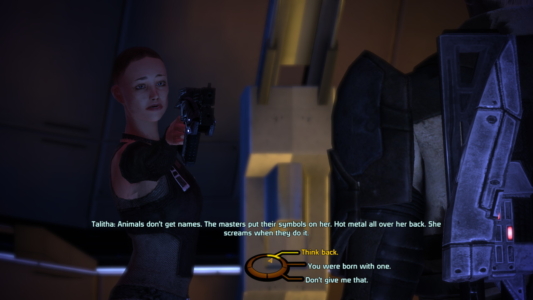
Talking down a troubled woman on the Citadel. Dumping some points into your Charm and Intimidate skills allows you access to additional dialogue options which can be handy in situations like this.
You may supplement your blasting with abilities from other classes, making use of expertise in tech to disable enemy shields and weapons, or in biotics to throw, lift or otherwise damage advancing enemies. As you have a squad at your disposal, you don’t have to rely on your own abilities alone, and by pressing the space bar you can pause the action and assign instructions to your team mates, who will nevertheless act of their own accord (with variable results) should you fail to issue any direct orders. (Incidentally, despite originally being an Xbox 360 title, controls are all keyboard/mouse by default, and pad support is apparently lacking. I say ‘apparently’, because I prefer mouse/keyboard anyway, but there are patches and modes to improve pad support if you so desire).
Preliminaries and tutorial over, the game proper begins as you find yourself on the Citadel, the main hub of government and home of the Council. Long story short, you are ultimately given Spectre status, and use of the Normandy, in order to investigate Saren’s activities. At the Citadel, there will be a variety of small quests, some of which will allow you to bolster your squad options, as you help out other characters, who then agree to join you in return. So in addition to the initial squad of Alliance soldiers Kaiden and Ashley, you can add Citadel Security officer Garrus, Krogan bounty hunter Wrex, and tech expert Tali.
Before you embark on your quest of major galactic importance, you can also take a longer look around the Citadel and will likely be bombarded by seemingly unimportant requests from a variety of people. Although it goes against the thrust of the narrative somewhat, in RPG-land it does of course pay to dive into the side quests and beef up your character somewhat before taking on the main missions. On the Citadel at least, there is the impression of a hive of activity, with quests making you feel like you’re sorting things out as a general boss man, and some interesting little stories are told.
Sometimes information uncovered on the Citadel leads you to other planets, and what we shall call extremely generic planet-based missions. However interesting the setup, each will involve you landing on the surface in your M35 Mako, a six-wheeled ATV much derided by fans of the series, and proceed to investigate various sites of interest, which will either lead to an investigation of some debris, or some kind of outdoor combat, closely followed by a venture indoors for a shoot out at closer quarters. XP and weapons are your reward here, rather than any significant story developments, and many simply end with a short text description of what has transpired. There are a couple of exceptions, in which members of your crew ask for assistance on a personal mission of revenge, and these are fleshed out a little more, and others come with a well done message from the unseen Admiral Hackett (voiced by Lance Henriksen!) but they are otherwise rather unsatisfying. For a game with such cinematic aspirations they do seem rather like a cut corner.
All of which leaves the big story itself, which is broken down into chapters, each of which takes place on an individual planet. At the outset, you have a choice of which lead to follow to begin your investigation: Noveria, a private world of corporate research external from Council influence; Feros, a human colony under Geth attack; or alternatively you can go searching in the Artemis Tau cluster for Dr Liara T’Soni, a missing scientist. It’s not really made clear in advance what the pros and cons of each choice are, although narratively speaking one makes the most sense as it allows you to recruit an additional squad member.
This is where it feels more like you’re playing a big space epic. And throughout you’ll be called upon to make dialogue choices and decisions that will impact the outcomes of certain plot threads, if not the main thrust of the overall story. Moreover, these choices will also carry forward into future games in the trilogy, if you choose to port your save over into the sequels, which strikes me as an impressive undertaking, although it’s not something I’ve been able to try out yet. There’s a nice balance of action vs story, and it reminded me of the Wing Commander FMV era, where the action was fun enough on its own but you were kind of playing to see what story tidbits you’d be thrown next: even if it wasn’t something major to do with the plot, each completed mission would at least reward you with another little conversation where you find out more about your crew or other characters.
Another echo of Wing Commander games 3-4 is the chance to either be good or bad, known here as making ‘Paragon’ and ‘Renegade’ choices. And, just as I could never quite bring myself to be rude to anyone in those games, because it all seemed a bit needless, it was the same here. I’d actually made a commitment to try and be a bit more Renegade this time around, but it just didn’t work out that way, with my morality stats showing me to be a mostly goody-two-shoes Shepard. Part of the problem is that there never seems to be any incentive not to do the right thing, with the Renegade options being less about having to make a tough choice despite harsh consequences and more about being a bit of a dick for the sake of being a dick.
For example, if the consequences of being lenient with a baddie were that they go off and cause you much more trouble later in the game, or if you could avoid a big and annoying fight just by doing something dubious, then you would face some interesting dilemmas. That’s not the case here, and often Renegade options just seem to be about going around being obnoxious in conversations and shooting anyone who annoys you too much. That’s not to say that there aren’t still some surprising and difficult choices along the way, and there are different outcomes possible even if you stick to the Paragon pathway of the good and righteous.
Having said all of that, it also has to be said that I’m not particularly imaginative when it comes to these things. I intended to experiment somewhat by picking a female Shepard (known colloquially as FemShep) and enjoying the voice performance by Jennifer Hale which has attracted a lot of admirers over the years (not that there’s necessarily anything wrong with the work of male counterpart Mark Meer). However, that ultimately lost out to my desire to continue future games with broadly similar choices to the ones I’d made in my previous attempt, sadly lost to the big hard drive in the sky [you mean ‘the loft’, right? – FFG reader]. I don’t know what the psychology is behind the characters people choose to play as in games, but I would imagine that some kind of extension of your real-life self is fairly common, so I naturally made my man-Shep look like a chap approaching a mid-life crisis, with a peroxide hairdo at odds with otherwise weathered facial features.
Mass Effect still looks perfectly alright to my eyes, although I guess it would do since those eyes belong to someone who hasn’t played too many recent titles, but the static nature of NPCs and the slightly robotic and creaky walking from side to side while making a point in conversation did seem worthy of note. Without wanting to labour the comparison with Wing Commander, I did have cause to reflect on something that came up when writing about the 2015 FMV adventure Her Story [with spoilers]: that for all the (often justified) criticism of video-heavy games in the 90s, they were better at conveying human movement and emotion than all of the fancy and expensive techniques that cook up the odd-looking 3D facsimiles of the modern age.
I’d also say that the fact-finding elements of the conversation wheel seem rather unnatural and at odds with the the cinematic elements of the story, as you meet someone and either ask them about an urgent update on the current situation or get them to dump lots of world-building information on you. At times, I had a sense of things feeling a little laboured, story-wise, possibly because my most significant experiences with more recent games are in the ones covered by our series of indie discussions, where tighter and more controlled tales are told across a smaller amount of time, and to great effect. Obviously those games are very different beasts to a sprawling RPG, and are meant to tell a very linear story instead of a complex branching one, and they’re also missing the blasting and other elements that make up the Mass Effect whole.
But these elements were the only ones that made me revisit the assertion that the game was dated, other than the frankly dreadful inventory system, which leaves you overflowing with pickups and having to spend many hours working out whether to sell or convert them to Omni-Gel (a substance that, despite its name, that only seems to have two purposes: fixing the Mako and bypassing the hacking mini-game). Either way, you have to do it item by item and it’s a real pain. There are weapons, upgrades and ammo types all filling up your inventory, and redistributing equipment and jettisoning it one item at a time is pretty fiddly and annoying. (At least ammo itself is infinite for some reason and doesn’t also have to be managed).
As previously mentioned, the Mako is apparently a commonly-identified object of complaint, but it never bothered me too much. I mean, you pretty much can’t crash it, and can send it hurtling over rocks and down steep inclines without incurring damage (and always landing the right way up). Plus it’s a lot of fun to vapourise enemy soldiers with the cannon. Sure, it *could* be slightly easier to handle, but you can’t have everything.
Other than the points already noted, and one or two annoying (but not fatal) bugs, Mass Effect still holds up pretty well. Last time around, I was possibly more excited by the story and extremely ignorant of the RPG side of things, possibly even blundering through while only paying attention to Shepard and completely ignoring the other squadmates, their equipment and abilities. This time it was more the other way around: the story felt slightly ponderous and something that interested me in as far as what it might mean for the next game, but I paid a lot more attention to my squad and the choices I was making with regard to skill points and special abilities. Consequently, progress through the game seemed easier this time with only one early mission causing problems. (Also I forgot to save a couple of times and then got caught out in combat, during which the feature is disabled).
A relative indifference to the narrative could be down to having played the game before, although upon revisiting my previous thoughts I noted even then that it seemed to borrow from other sci-fi stories without having too much more to say for itself. Often, the smaller, more contained moments, over which you have more influence, can be the most satisfying ones in an RPG, and that’s the case here, even if they’re contained within the big story missions rather than separated off into side-quests, which as already mentioned largely involve visiting boxy generic warehouses filled with baddies. On the other hand, I enjoyed the battles a lot more, having turned off auto level-up, and paying a lot more attention to equipment, skill points, and the abilities of my squad, using them to complement the approach of my own particular version of Shepard. I was a soldier (again) this time, but making use of tech and biotic abilities of squad mates made for much more balanced and enjoyable action this time around.
Who knows what graphical tricks the remaster will use to render the visuals acceptable to young eyes, but to this old-timer, with everything turned up high, it all still looks pretty good to me as it is. You can download mods and texture packs, the use of which I was actively considering until I realised that the tweaking of visual settings I’d actioned during an initial visit to the options menu actually required a restart of the game to take effect. The music is a collection of pleasingly appropriate sci-fi synths, with the music on planet Ilos in particular calling to mind elements of the Blade Runner soundtrack, which is of course A Good Thing.
I wasn’t quite sure what to expect from Mass Effect second time around, with the passage of time rendering it a mixture of the familiar and, er, stuff that I’d completely forgotten about. Overall, though, while some clunkiness is evident, the return trip finds it all in solid enough shape. Despite its length, it feels like the first part of something bigger, and you are left wanting more to some extent. More did, of course, follow, and we’ll hopefully get to that soon. I’m certainly intrigued by the potential and ambition of choices following through the different games rather than them being re-set by the writers at each turn. As a stand-alone title, this first game may not perhaps belong in the very top bracket, but remains a formidable effort with plenty to offer.

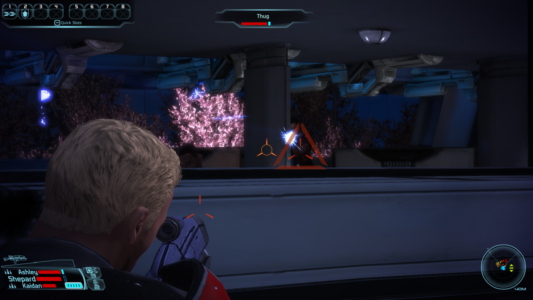
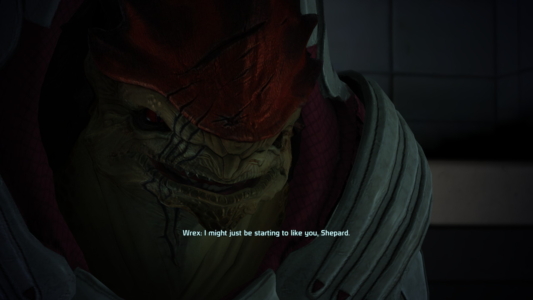
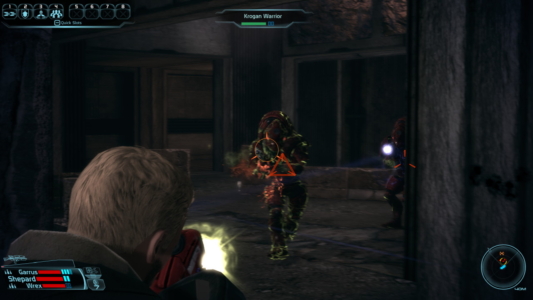
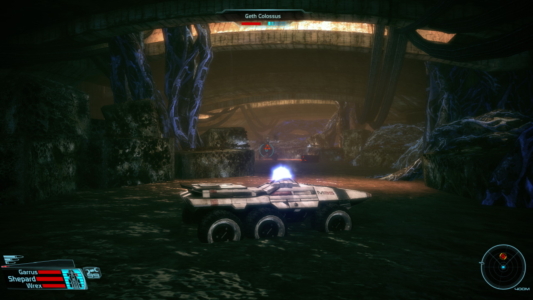
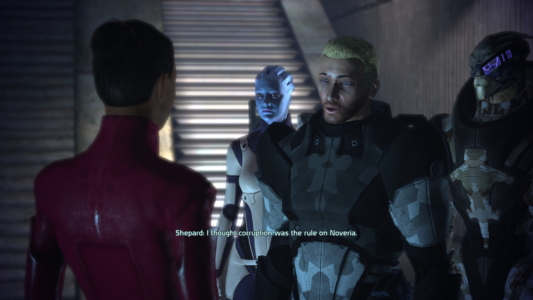

 Posts
Posts
“Regular readers, if any exist,” : I’m one of them. I appreciated this review for two reasons : 1) a few weeks ago, I suggested you go back to the Mass Effect trilogy (though I doubt my suggestion had any role in your chosing to go back to this game, eh eh) ; 2) it’s a nice birthday present (goddess Alea inspired you, it seems).
More seriously, I’d give it a 9. And the visuals are still pleasant, not needing any enhancement, for artistic direction was excellent (and this makes graphics quality, not texture resolution nor polygons). Higher resolution, wider screen, super-hyper-enhanced graphics are not necessary. I’d hate seeing Thief 1 and 2, or Tron 2.0 remade with today’s standards which do nothing to hide the poor game mechanisms of many today’s games, from what I can see in videos trailers. Blood still stands fine as it is, when Blood 2 is still ugly. Remastering seems akin to movie colorization : a nasty action.
“I don’t know what the psychology is behind the characters people choose to play as in games, but I would imagine that some kind of extension of your real-life self is fairly common” : this may be true for some people, but not for everyone. I’ve played ME trilogy three times, always chosing a feminine Shephard for one simple reason which, as far as I can remember, is also the reason for which Tomb Raider, while started as a male character, became Lara Croft : if I’m to look at a character for hours, I prefer it to be a seductive one, for I don’t project myself in the game’s hero : I control it. 😉
Thanks for a nice review. Let’s hope in the following years, we get ME2 and ME3 !
February 2, 2021 @ 12:16 am
Plans to move on to ME2 soon? I remember most of the connections and “your choices matter!” being lost on me in the years between 1 and 2. But then I wasn’t an ME superfan either.
Also proudly on Team Mako. The sequel’s scanning minigame can go kick rocks.
February 3, 2021 @ 4:18 am
Yes, ME2 soon is the plan!
As you say JMan, I think there is a danger of forgetting those story connections if I leave it too long…
February 3, 2021 @ 9:43 am